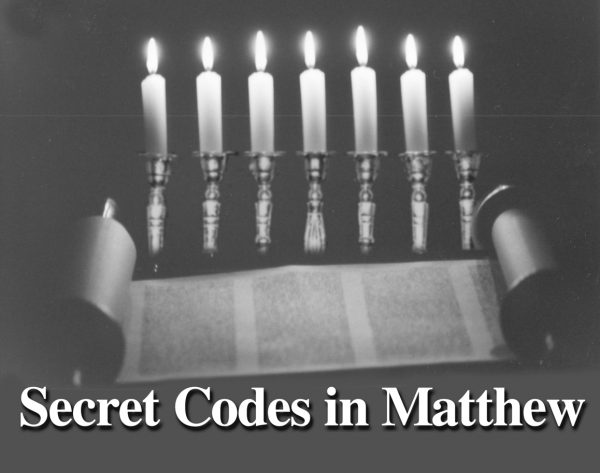The Secret Codes in Matthew: Examining Israel’s Messiah, Part 7: Matthew 8 – 11:5, by Kevin M. Williams

Some scholars believe that when Yeshua (Jesus) and his disciples were walking the earth, messianic expectations were extremely high. There were those Hebrew scholars of the day who were well acquainted with Daniel chapter nine, and according to the “weeks” and “sevens,” they knew the Messiah’s arrival was imminent. As a result there were many people calling themselves “the messiah.” We see a glimpse of this in the book of Acts, when the famous Torah scholar Gamliel (as it is pronounced in the synagogue) speaks:
But a certain Pharisee named Gamaliel, a teacher of the Law, respected by all the people, stood up in the Council and gave orders to put the men outside for a short time. And he said to them, “Men of Israel, take care what you propose to do with these men. For some time ago Theudas rose up, claiming to be somebody; and a group of about four hundred men joined up with him. And he was slain; and all who followed him were dispersed and came to nothing. After this man Judas of Galilee rose up in the days of the census, and drew away some people after him, he too perished, and all those who followed him were scattered. And so in the present case, I say to you, stay away from these men and let them alone, for if this plan or action should be of men, it will be overthrown; but if it is of God, you will not be able to overthrow them; or else you may even be found fighting against God.” And they took his advice (Acts 5:34-40).
Indeed, from the days before Yeshua, up until the Roman urban renewal program of 135 CE when the city of Jerusalem was plowed under, “messiahs” popped up on a fairly regular basis.
If you were alive in those days and “yet another” messiah candidate appeared, like yesterday’s bad meatloaf, what would it take to set him apart and capture your attention? Even today we have rumors of this prophet or that prophet, this healer or that healer, this move of the Holy Spirit and that move of the Holy Spirit. It is difficult to not become jaded, particularly when frauds are so often exposed.
There were certain telltale signs for which the religious community of Yeshua’s day were looking. We find them encapsulated in a message Yeshua sends to his cousin John.
“Go and report to John what you have seen and heard: the blind receive sight, the lame walk, the lepers are cleansed, and the deaf hear, the dead are raised up, the poor have the gospel preached to them” (Luke 7:22).
These elements, along with a superlative ability to elucidate the Torah, would mark the “one” as the Messiah. What made Yeshua’s ministry stand out among the crowd? He fulfilled their expectations and He fulfilled what the prophets had promised. This makes him such a likely candidate that the Pharisees begin to tail Him, watching His actions and questioning His motives. Yeshua certainly was the most likely candidate they had seen yet.
In part six we saw how Yeshua was not only able to explain the Torah, but to put it into a deeply spiritual application exceeding “mere works.” In this part, we will see if He was able to meet the other items on their “wish list.”
Category: Biblical Studies, Fall 2002, Pneuma Review


